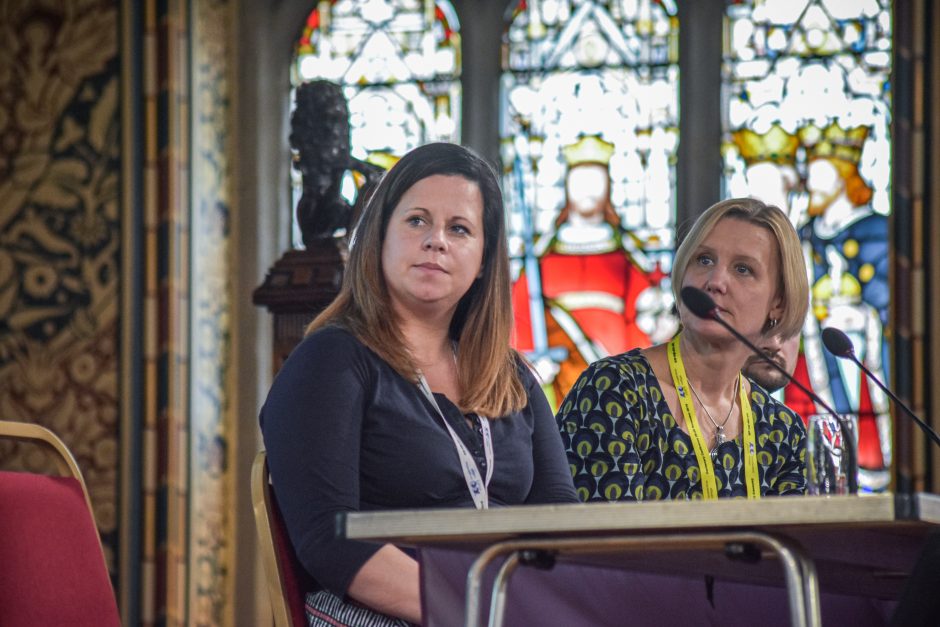The role co-ops can play in building peace was discussed by a panel at the Co-operative College’s centenary conference last week.
Panelists at the event, held at Rochdale Town Hall, included Mully Dor, who discussed the work of the Center for Cooperative Development of the Negev Institute for Strategies of Peace and Development (AJEEC-NISPED). The centre was founded in 1998 by Dr Yehuda Paz, who dedicated his life to working towards peace between Israel and Palestine.
In 2011 the centre created a regional network to restart the conversation around the Arab Peace Initiative, a proposal for an end to the Arab–Israeli conflict that was endorsed by the Arab League in 2002.
Between 2011 and 2017 the network hosted 140 events to engage politicians and civil society actors On 31 July 2013 it organised a meeting at the Israeli parliament, with Labor MP Yechiel Bar and Palestinian Council members Abdalla Abdalla and Muchamad El Madani. The meeting was the first time the Palestinian flag was on display in the Parliament.
Over 1,000 activists from Arab countries, Palestine and Israel took part in the events organised by the centre, with conferences in Egypt, Turkey, Cyprus, Jordan, Czech Republic, Jerusalem and Belgium.
“The project helped to raise awareness about the approach,” said Mr Dor. “We maintain contacts with most of them and we support some academic projects who continue to inform the public about the situation in the Middle East from a civic point of view, like the Forum for Regional thinking.”
Next, Jeffrey Moxom talked about the ICA-EU partnership for international co-operative development, which aims to show that co-ops are an instrument for change. In march Cooperatives Europe published a thematic research paper Cooperatives and Peace: Strengthening Democracy, Participation and Trust, showcasing 20 case studies from more than 14 countries, covering different types and stages of conflicts.
The research was produced in the framework of the ICA-EU Partnership (#coops4dev) and supported by the Cooperatives Europe Development Platform (CEDP). It builds on previous work by Prof Ian MacPherson and Dr Yehuda Paz – both of whom died in 2013.
Related: Andy Burnham calls for more devolution at education conference
Mr Moxom said co-ops were crucial to people-centred approaches to peace, empowering and facilitating local people’s direct involvement in decision-making. The study found that their inclusive approach means co-ops can build trust, create an environment that prevents intolerance, and foster education and training. This improves job security and labour rights, says the paper.
The study also recommends promoting local ownership, supporting education and training to foster peace building and ensuring co-operation between co-ops and other partners.
Participants also heard from international development consultant Andrea Wilkinson, who is UN Sustainable Development Goals and Global Challenges Research Associate at Newcastle University. She leads the Co-operative College’s work on a four-year capacity building project in Rwanda.

She talked about Buranga women’s co-operative, which was formed not to make peace but to secure a safe living. Most of the women were raped during the 1994 genocide and are now living with HIV. Through the co-op they are able to produce and sell their crafts. The name of the co-op, which comes from the name of the village where they live, translates as ‘beauty’.
“Through working together they found the power of co-operation,” said Ms Wilkinson.
Colm Massey from the Solidarity Economy Association and Cath Muller from Cornerstone Housing Co-op argued the movement needed to be more critical of some governments and to push for political change.
In response, Mully Dor said his centre had been working with Palestinian groups as part of a bottom-up approach to peace but that this had not led to a change in the bigger picture. As a result, the centre started engaging with political players to try to change their view on regional agreements.
“Yes, the co-op movement needs to be more critical of governments in some cases, we also have to be self-critical and keep in mind that a number of important conditions need to be in place for co-operatives to be successful peace building actors,” added Mr Moxom.